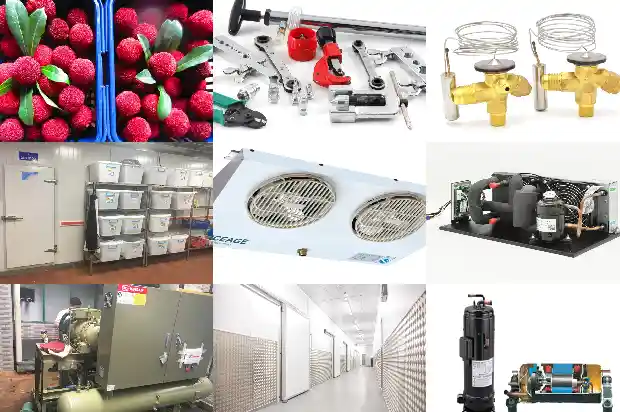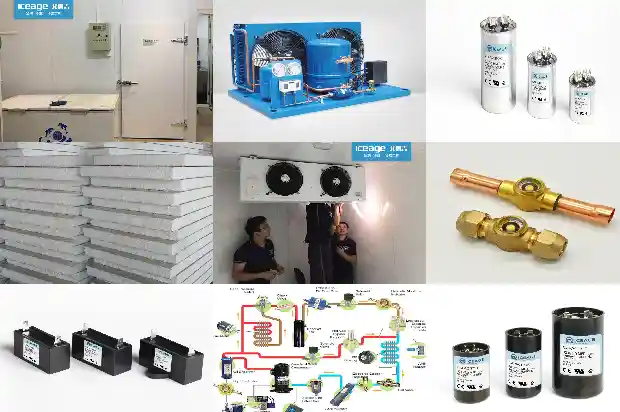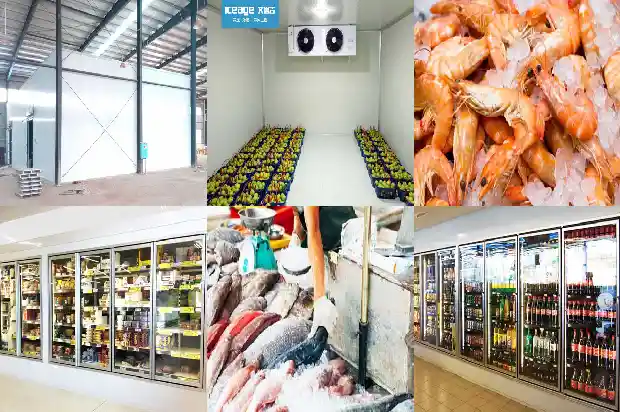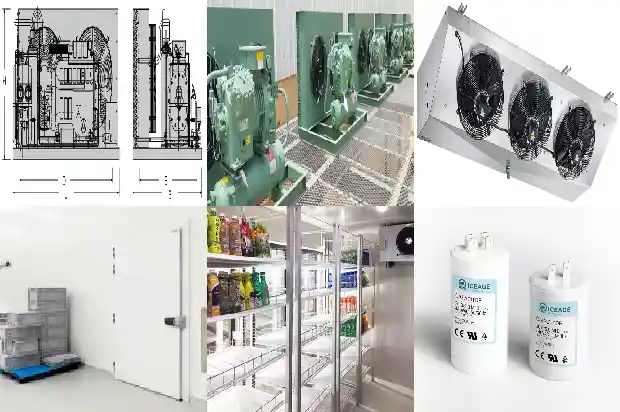How to Choose Between Inverter Air Conditioners and Fixed-frequency Air Conditioners? Let's See What Maintenance Technicians Say
2025-04-09
Air conditioners are relatively common household appliances. When purchasing them, many people are torn between choosing an inverter air conditioner and a fixed-frequency air conditioner. Some people care about the price difference at the initial purchase, some care about the failure rate during use, some care about the maintenance cost, and some care about the electricity cost during use, and so on. I have installed both an inverter air conditioner and a fixed-frequency air conditioner at home. Combining my years of usage experience and the experience I gained from conversations with maintenance technicians, I will talk about the differences between the two types of air conditioners.

The Main Differences between Inverter Air Conditioners and Fixed-frequency Air Conditioners:
In terms of compressor control, the working principle of an inverter air conditioner is that it operates in a variable-speed manner throughout the entire process from startup to shutdown. According to the actual cooling capacity requirements of the room, the compressor runs at different speeds. When the air conditioner is turned on and starts operating, the compressor immediately starts running at a high speed. After the room temperature reaches the set temperature, the compressor reduces from high-speed operation to low-speed operation. When the room temperature rises again, the compressor will increase from low-speed operation to high-speed operation, quickly stabilizing the room temperature at the set temperature value. It maintains this operating state throughout the whole process.
The working principle of a fixed-frequency air conditioner is that it operates at the highest running speed throughout the entire process from startup to shutdown. As long as there is a cooling demand in the room, the compressor will run at a high speed until the room temperature reaches the set value.
In terms of compressor control, the working principle of an inverter air conditioner is that it operates in a variable-speed manner throughout the entire process from startup to shutdown. According to the actual cooling capacity requirements of the room, the compressor runs at different speeds. When the air conditioner is turned on and starts operating, the compressor immediately starts running at a high speed. After the room temperature reaches the set temperature, the compressor reduces from high-speed operation to low-speed operation. When the room temperature rises again, the compressor will increase from low-speed operation to high-speed operation, quickly stabilizing the room temperature at the set temperature value. It maintains this operating state throughout the whole process.
The working principle of a fixed-frequency air conditioner is that it operates at the highest running speed throughout the entire process from startup to shutdown. As long as there is a cooling demand in the room, the compressor will run at a high speed until the room temperature reaches the set value.

Differences in Power Consumption
In terms of energy efficiency, inverter air conditioners of the same level are more energy-efficient than fixed-frequency air conditioners, which is the biggest reason why many users choose fixed-frequency air conditioners. However, in real life, the power consumption is related to the usage time. Moreover, within the effective service life of the air conditioner, the electricity cost saved may be less than the price difference at the initial purchase.
The compressor of an air conditioner consumes a large amount of electricity at the moment of startup. And the working mode of a fixed-frequency air conditioner is that the compressor stops and starts frequently. Therefore, frequent startup of the compressor is relatively power-consuming. However, the inverter air conditioner is always working. Even in the low-speed state, it still consumes electricity. At this time, the compressor of the fixed-frequency air conditioner has been turned off and does not consume electricity, so the fixed-frequency air conditioner seems to be a bit more power-saving at this moment.
In real life, the power-saving ability of inverter air conditioners is not much stronger than that of fixed-frequency air conditioners. Instead, the initial purchase price of inverter air conditioners is much higher. According to the annual usage time of the air conditioner, the extra purchase price of the inverter air conditioner is enough for the fixed-frequency air conditioner to be used for many years. And when the air conditioner is used for a short time, both the fixed-frequency and the inverter air conditioners operate at full load, and the power consumption is almost the same at this time. Only when used for a long time can the power-saving feature of the inverter air conditioner be reflected.
In terms of energy efficiency, inverter air conditioners of the same level are more energy-efficient than fixed-frequency air conditioners, which is the biggest reason why many users choose fixed-frequency air conditioners. However, in real life, the power consumption is related to the usage time. Moreover, within the effective service life of the air conditioner, the electricity cost saved may be less than the price difference at the initial purchase.
The compressor of an air conditioner consumes a large amount of electricity at the moment of startup. And the working mode of a fixed-frequency air conditioner is that the compressor stops and starts frequently. Therefore, frequent startup of the compressor is relatively power-consuming. However, the inverter air conditioner is always working. Even in the low-speed state, it still consumes electricity. At this time, the compressor of the fixed-frequency air conditioner has been turned off and does not consume electricity, so the fixed-frequency air conditioner seems to be a bit more power-saving at this moment.
In real life, the power-saving ability of inverter air conditioners is not much stronger than that of fixed-frequency air conditioners. Instead, the initial purchase price of inverter air conditioners is much higher. According to the annual usage time of the air conditioner, the extra purchase price of the inverter air conditioner is enough for the fixed-frequency air conditioner to be used for many years. And when the air conditioner is used for a short time, both the fixed-frequency and the inverter air conditioners operate at full load, and the power consumption is almost the same at this time. Only when used for a long time can the power-saving feature of the inverter air conditioner be reflected.
Differences in Comfort
People now have relatively high requirements for comfort in their quality of life. In terms of actual feelings, the comfort level of inverter air conditioners is much higher than that of fixed-frequency air conditioners, which can be judged from the outlet air temperature, operating wind speed, and operating noise.
Outlet Air Temperature
It is known that when the air conditioner temperature is 26°C, it is a relatively comfortable temperature, neither too hot nor too cold, and people can stay clear-headed. But to maintain the constancy of this temperature, fixed-frequency air conditioners perform worse than inverter air conditioners.
When using a fixed-frequency air conditioner, the room can quickly reach the set temperature. At this time, the air conditioner compressor will stop. As time goes by and heat enters the room, the room temperature will rise again, and the air conditioner will restart the compressor. The air conditioner is always on, but the compressor will start frequently, and the room temperature will fluctuate greatly, making people feel alternately cold and hot.
When using an inverter air conditioner, the room will also quickly reach the set temperature. At this time, the air conditioner compressor changes its operating speed and will not stop. After there are slight temperature changes in the room, the compressor will immediately switch its operating speed, thus keeping the room temperature constant and preventing people from feeling alternately cold and hot.
Operating Wind Speed
The air outlet of an air conditioner should avoid blowing directly at people, especially the elderly and children. The temperature of the air outlet of a common air conditioner is between 7°C and 10°C, and the air blown out by the fan is extremely cold, while the set temperature of the room is much higher than the temperature of the air outlet.
When a fixed-frequency air conditioner is cooling, it blows air at the maximum wind speed to quickly reach the room temperature. After reaching the temperature, the compressor stops working, and the indoor fan will change to a medium or low speed. However, at this time, the air conditioner is not cooling.
Operating Noise
When the indoor unit of an air conditioner is operating, the rotation of the fan will generate noise. However, the noise levels of the two types of air conditioners are slightly different.
Fixed-frequency air conditioners control the temperature through the frequent startup and shutdown of the compressor, and there will be a relatively large sound when starting and stopping. With the change of the room temperature, the sound will appear at intervals. Inverter air conditioners control the temperature by adjusting the speed of the compressor. The compressor will not stop in the middle, and the adjustment process is relatively smooth, without the switch sound during startup and shutdown.
In addition, after the room temperature reaches the set value in an inverter air conditioner, the compressor runs at a low speed, and the fan will also run at a low speed. At this time, the sound is also lower than the sound of the fixed-frequency air conditioner running continuously at a high speed.
People now have relatively high requirements for comfort in their quality of life. In terms of actual feelings, the comfort level of inverter air conditioners is much higher than that of fixed-frequency air conditioners, which can be judged from the outlet air temperature, operating wind speed, and operating noise.
Outlet Air Temperature
It is known that when the air conditioner temperature is 26°C, it is a relatively comfortable temperature, neither too hot nor too cold, and people can stay clear-headed. But to maintain the constancy of this temperature, fixed-frequency air conditioners perform worse than inverter air conditioners.
When using a fixed-frequency air conditioner, the room can quickly reach the set temperature. At this time, the air conditioner compressor will stop. As time goes by and heat enters the room, the room temperature will rise again, and the air conditioner will restart the compressor. The air conditioner is always on, but the compressor will start frequently, and the room temperature will fluctuate greatly, making people feel alternately cold and hot.

When using an inverter air conditioner, the room will also quickly reach the set temperature. At this time, the air conditioner compressor changes its operating speed and will not stop. After there are slight temperature changes in the room, the compressor will immediately switch its operating speed, thus keeping the room temperature constant and preventing people from feeling alternately cold and hot.
Operating Wind Speed
The air outlet of an air conditioner should avoid blowing directly at people, especially the elderly and children. The temperature of the air outlet of a common air conditioner is between 7°C and 10°C, and the air blown out by the fan is extremely cold, while the set temperature of the room is much higher than the temperature of the air outlet.
When a fixed-frequency air conditioner is cooling, it blows air at the maximum wind speed to quickly reach the room temperature. After reaching the temperature, the compressor stops working, and the indoor fan will change to a medium or low speed. However, at this time, the air conditioner is not cooling.

Operating Noise
When the indoor unit of an air conditioner is operating, the rotation of the fan will generate noise. However, the noise levels of the two types of air conditioners are slightly different.
Fixed-frequency air conditioners control the temperature through the frequent startup and shutdown of the compressor, and there will be a relatively large sound when starting and stopping. With the change of the room temperature, the sound will appear at intervals. Inverter air conditioners control the temperature by adjusting the speed of the compressor. The compressor will not stop in the middle, and the adjustment process is relatively smooth, without the switch sound during startup and shutdown.
In addition, after the room temperature reaches the set value in an inverter air conditioner, the compressor runs at a low speed, and the fan will also run at a low speed. At this time, the sound is also lower than the sound of the fixed-frequency air conditioner running continuously at a high speed.
Differences in Service Life
Air conditioners are electrical appliances, and they all have problems such as failure rates and service life.
From the analysis of the failure rate, the inverter air conditioner system is more complex, uses more components, and has more failure points. Therefore, the probability of maintenance is higher. On the contrary, the fixed-frequency air conditioner system is simpler, and the probability of failure during use is lower. According to maintenance technicians, the maintenance probability of inverter air conditioners on the market is much higher than that of fixed-frequency air conditioners.
From the analysis of the maintenance cost, inverter air conditioners need to use an inverter. This component works more frequently, has a higher probability of failure, and the replacement price is usually several hundred yuan. If there is a refrigerant leakage in the air conditioner, the cost of adding refrigerant is also different. Fixed-frequency air conditioners generally use R22, and inverter air conditioners generally use R410A. R22 is much cheaper in price. Moreover, R22 refrigerant has a lower requirement for the pipeline pressure, and the filling weight is much less. Therefore, the cost of adding refrigerant to a fixed-frequency air conditioner is lower than that of an inverter air conditioner.
Air conditioners are electrical appliances, and they all have problems such as failure rates and service life.
From the analysis of the failure rate, the inverter air conditioner system is more complex, uses more components, and has more failure points. Therefore, the probability of maintenance is higher. On the contrary, the fixed-frequency air conditioner system is simpler, and the probability of failure during use is lower. According to maintenance technicians, the maintenance probability of inverter air conditioners on the market is much higher than that of fixed-frequency air conditioners.
From the analysis of the maintenance cost, inverter air conditioners need to use an inverter. This component works more frequently, has a higher probability of failure, and the replacement price is usually several hundred yuan. If there is a refrigerant leakage in the air conditioner, the cost of adding refrigerant is also different. Fixed-frequency air conditioners generally use R22, and inverter air conditioners generally use R410A. R22 is much cheaper in price. Moreover, R22 refrigerant has a lower requirement for the pipeline pressure, and the filling weight is much less. Therefore, the cost of adding refrigerant to a fixed-frequency air conditioner is lower than that of an inverter air conditioner.
Summary
The above is an analysis of fixed-frequency air conditioners and inverter air conditioners. In fact, both have their own advantages and disadvantages. For those who care about power consumption, considering the difference in the initial purchase cost and the usage time, the comprehensive cost difference between the two is not significant. For those who care about comfort, inverter air conditioners have a greater advantage. For those who care about the purchase cost-effectiveness, service life, and repair rate, fixed-frequency air conditioners have a greater advantage.
The above is an analysis of fixed-frequency air conditioners and inverter air conditioners. In fact, both have their own advantages and disadvantages. For those who care about power consumption, considering the difference in the initial purchase cost and the usage time, the comprehensive cost difference between the two is not significant. For those who care about comfort, inverter air conditioners have a greater advantage. For those who care about the purchase cost-effectiveness, service life, and repair rate, fixed-frequency air conditioners have a greater advantage.
Related Articles
- Working Principle of AC Inverter and DC Inverter Air Conditioners
- What Malfunction Does "E2" Indicate on an Air Conditioner?
- Can a Tiny Copper Tube Cause a Multi - Split Air Conditioner to Stop Cooling?
- In - depth Explanation of Large - temperature - difference Ice - storage Air - conditioning Systems
- Comprehensive Insights into Large - Temperature - Difference Ice - storage Air - Conditioning Systems
- Comprehensive Maintenance Guide for Air - Conditioning Hosts, Ducts, Chilled Water, and Cooling Water
- A Summary of 11 Common Faults in Refrigeration and Air Conditioning Systems
- Winter Anti-freezing Measures for Air Conditioning Equipment and Fire Protection Systems
- A Complete Guide to the Operation, Malfunctions and Repair Methods of Dry Screw Refrigeration Compressors!
- In Refrigeration Repair, Analyzing and Handling Three Major Series of Malfunctions - "Blockage", "High Pressure" and "High Discharge Temperature" are Essential!
- How to Properly Remove Ammonia Refrigerant during Refrigeration Parts Repair
- Precautions for Welding Air - conditioner Copper Tubes
- Why Does the Air - conditioner Compressor Stop Running in Less Than 1 Minute?
- How to Solve Practical Problems of Air - conditioner Leakage, Noise and Refrigerant Leakage?
- How to Improve the Energy Efficiency of Air - conditioner Compressors?
- Maintenance Methods for Exhaust Volume and Winding Performance of Typical Air - conditioner Compressors
- Air Conditioners Also Have a "Shelf Life". If on a Tight Budget, Don't Rush to Replace. Try This and It Could Last a Few More Years
- Manifestations of Insufficient Air - conditioner Refrigerant and Judgment of the Charging Amount
